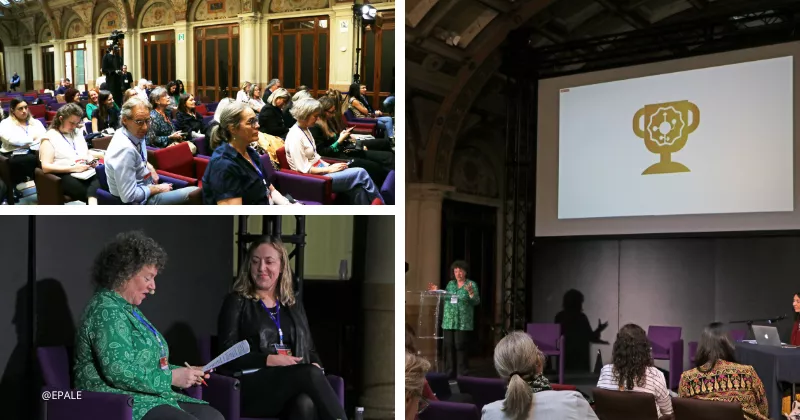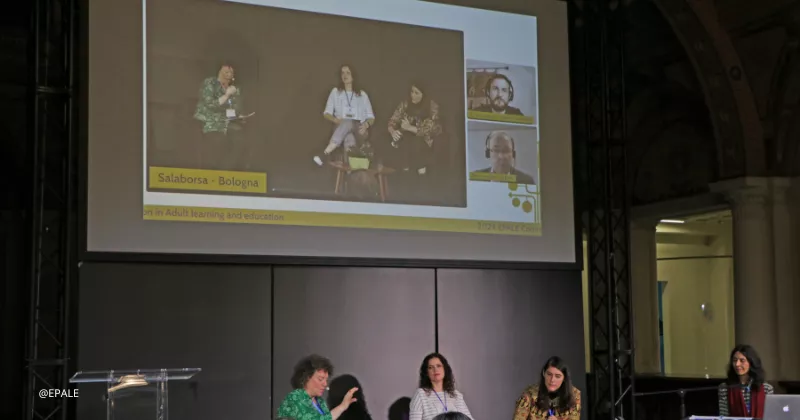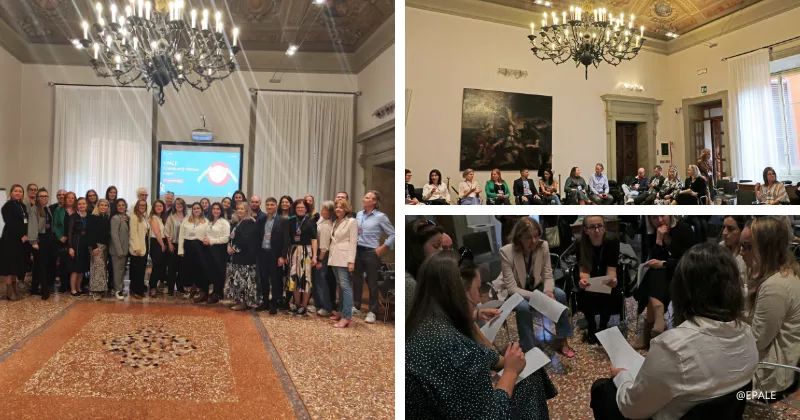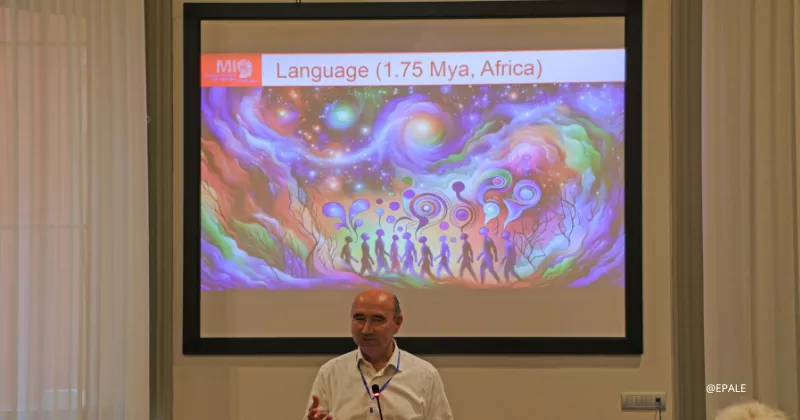Adult education has never been more important
Adult educators are undoubtedly one of the most progressive social groups. In recent years, they have succeeded in shedding the traditional image of learning tied to classrooms, blackboards and chalk. Education has been brought to where it is genuinely needed and where it has an immediate impact – among the people. This shift was demonstrated through numerous examples of best practices at the recent EPALE Community Conference held in Bologna and online.
Bologna, home to the Alma Mater Studiorum, hosted the first day of this year's EPALE Community Conference. On Tuesday, 15 October, a hybrid event took place in the stunning Salaborsa Library on the main square in the city centre, while the following two days of the conference were held online. This approach proved to be excellent, as an engaging discussion unfolded in the Zoom chatroom alongside the main programme.

Forward. Adult Learning: Igniting Change, Shaping Tomorrow
The conference, boldly titled, was founded on the principle that adult education is crucial in shaping our future. Numerous experts demonstrated through their presentations that programme and activity creators are never short on ideas for connecting with vulnerable groups and enhancing adults' competencies in areas where these groups may not initially see the need. The theme of the first day was Upskilling and Reskilling for the Digital Transition.
"Who sets the rules in the digital world, and how does this impact our privacy?" asked the event's moderator, Tamsin Rose. The morning's speakers delved into finding an answer, with a lively exchange of ideas coming from both the audience in the hall and those attending online.
We need a decade of skills!
Policy representatives were unanimous in their messages: raising awareness for skill enhancement is critical. For that reason, the European Year of Skills initiative, despite its official end, is far from over. Skills are more crucial than ever today and will only grow in importance for the future.

A representative from the Municipality of Bologna captivated the audience with her reflections on the value of human capital in shaping the future. "Skills are weapons in the fight against major social issues," she emphasised.
Who holds power in the digital world?
The keynote speaker, Jillian C. York, an American activist and expert on freedom of expression online, digital rights and surveillance, posed a question: how, if at all, can the digital transition be guided? She discussed the complex relationship between freedom of speech and the right to expression, highlighting that different countries legislate these issues with markedly varied approaches, resulting in unequal rights worldwide. She advocates for a safer, more accessible and open internet. Some audience members added their perspectives, pointing out issues of excessive surveillance and sharing ways they've managed to bypass technology to secure their right to privacy. A representative from the Dutch NSS proposed educating people on culturally acceptable practices in the digital realm.

The final part of the session in the hall was as engaging in content as it was in organisation. Safa Ghnaim, an educator and expert in instructional design and curriculum development, and Gema Parrado León, a seasoned adult educator, joined Tamsin Rose on stage. Joe Litobarski, a researcher at Maastricht University, and Michael Horgan, a representative of the Directorate-General for Employment, Social Affairs and Inclusion (DG EMPL) at the European Commission, contributed to the discussion remotely.
Fear of technology is nothing new
The audience in the hall was particularly captivated by Gema's approaches to strengthening digital skills in rural Spain. In fact, she confirmed what has long been known in the field: bringing skills directly to the community and fostering positive word-of-mouth is a recipe for success. Her work also underscored a second truth: when we learn, progress is rarely confined to a single area. Joe Litobarski, on the other hand, delved into the intricacies of both ICT and artificial intelligence, helping to dispel fears surrounding technology. Adult educators in attendance gleaned an important lesson between the lines: they must adapt their own digital skills, as a significant gap between the knowledge of participants and teachers can have long-term negative consequences. "It's important to talk about this with students so our brains don't turn to mush," Litobarski quipped humorously.
Team building on innovative learning approaches
In the afternoon, we, the invited 'Heroes', spend time off-camera. In the beautiful Sala dello Zodiaco at the Palazzo Malvezzi, we attended presentations on innovative approaches to enhancing cultural skills and an engaging lecture on artificial intelligence.
Earlier that morning, the city representative had mentioned Bologna's intriguing migration policy in her welcoming address. Every newborn, regardless of origin, is symbolically embraced into the municipal community. This spirit of coexistence between locals and migrants is palpable throughout the ancient city.

We heard presentations on activities at the university, museum and prison. In groups, we discussed the unique benefits and opportunities that each approach offers. We were especially impressed by outreach activities through which our moderators engage with vulnerable groups, achieving meaningful results. Unfortunately, the choice of venue was not ideal, making the conversation challenging, but the event's purpose was fulfilled – along with professional insights, we enjoyed some informal discussions as well.
Creative capital and artificial intelligence
Giovanni Emanuele Corazza, an engineer with a PhD in sociology, encouraged us to tap into our creative potential boldly. In his presentation on the history of technology, he illustrated how humanity has always harnessed cognitive abilities for progress. He also highlighted the ethical issues, which are undeniably crucial when dealing with artificial intelligence.
Adult education for progress, technological development and community life
The final two days of the EPALE Community Conference took place online. This shift took nothing away from experience; in fact, on the first day, I even felt that those of us in the hall might have been at a slight disadvantage, as we couldn't follow the online events. The organisers ensured we were informed and could discuss the online content, but … The comments are thought-provoking; you can read them yourself when watching the recordings on YouTube.

On the second day, while returning home, I continued to follow the conference events while waiting for my train and during the journey to Venice. The theme Education for All – A Way Out of Poverty was explored in a particularly engaging way. The speakers were representatives of various groups working directly with disadvantaged populations. Once again, adult educators demonstrated their remarkable creativity – they invited experts who had never imagined themselves as educators to take part. This approach allowed education to shed its associations with classrooms, blackboards and chalk, bringing it directly to where it was needed most and where it could have the most immediate impact – among the people.
The journey to Bologna as a skills-building experience
Informal education often has the unintended effect of strengthening us with various interconnected (or unconnected) skills. This is precisely how I view my journey to Bologna. Planning the trip, booking accommodation and navigating unfamiliar environments boosted my confidence in handling new situations. Meeting new people, engaging in formal and non-formal communication, and socialising enriched me. Altogether, it was an unforgettable experience. A new collaboration has even emerged, as we, the Community Heroes, now have our own group on EPALE, and further collaborations are just a matter of time.
Ana Peklenik o branju, pisanju, izobraževanju odraslih in vseživljenjskem učenju ozavešča kot knjižničarka Andragoškega centra Slovenije. Branje je ena njenih najzgodnejših ljubezni. Verjame, da kdor bere, nikoli ne ostane brez besed.
Comments
Ponosni smo na našo herojinjo EPALE
Izobraževanje odraslih pogosto vzpostavlja most med preteklostjo, sedanjostjo in prihodnostjo. Očitno je bilo tako tudi na letošnji konferenci skupnosti EPALE! Vsa tri (navidezna?) časovna obzorja so enako pomembna za celostnost našega zaznavanja in delovanja. Med seboj se prepletajo in prav je, da je ob tem čutiti spoštljivost za 'staro' ter odprtost za 'novo'. Pri slednjem je na mestu previdnost, na kar je opozorila Gemma, ter upoštevanje temeljnih vrednot.
Hvala, Ana, da si nam skrajšala pot do nekaterih ključnih konferenčnih sporočil, ter čestitke za uspešno osebno učno lekcijo, povezano z dogodkom. Pa uspešno nadaljevanje vloge herojinje EPALE!





Mācīties nozīmē nenovecot
Pilnīgi piekrītu autorei, ka mūžizglībai ir ļoti liela nozīme ne tikai lai cilvēks noturētu prasmes būt labs darba tirgus dalībnieks, bet arī tam, ka šī sevis uzturēšana atvērtībā jaunām zināšanām ietekmē cilvēka dzīves kvalitāti un spēju iekļauties mūsdienu pasaules dzīves ritmā.